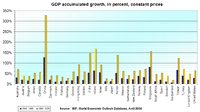
Photo from wikipedia
Abstract Increased clean energy production from household solar panels is a potentially vital. component of a sustainable energy transition and decarbonisation that can reduce carbon dioxide emissions from many countries.… Click to show full abstract
Abstract Increased clean energy production from household solar panels is a potentially vital. component of a sustainable energy transition and decarbonisation that can reduce carbon dioxide emissions from many countries. This paper investigates multiple channels of wealth effects on household solar-panel uptake. There is evidence of impacts of both financial and non-financial assets on solar-panel uptake, but the evidence for financial assets is much more robust. Compared to the highest-asset quartile, proportional solar-panel uptake is three percentage points lower for the second-highest quartile of households based on financial assets, all else equal. This gap grows to six percentage points for households in the lowest quartile for financial assets. The results are robust across many models using probit, logit and linear probability formats. Knowledge of the relative magnitudes of impacts of wealth channels is important for policymakers who are considering supporting solar-panel uptake, particularly following the COVID-19 pandemic, when efficiency of public spending will be crucial. Our results reveal that means testing for solar policy support should be based on financial-asset thresholds, rather than non-financial assets or income. These are globally important policy lessons in creating a viable climate change adaptation strategy through solar electrification.
Journal Title: Journal of Cleaner Production
Year Published: 2021
Link to full text (if available)
Share on Social Media: Sign Up to like & get
recommendations!